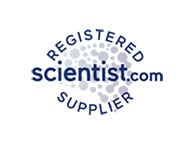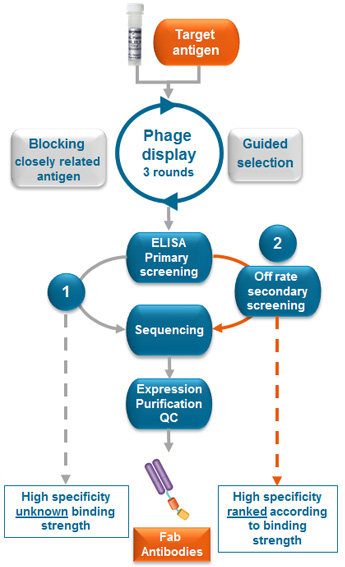Selection of Antibodies Based on Binding Strength
-
Monoclonal Generation
-
Custom Recombinant Monoclonal Antibody Generation
-
HuCAL® Antibody Generation Process
- Antigens and antigen expression services
- Guided Selection Strategies
- Affinity maturation
- Selection of antibodies based on binding strength
- Extended QC services
- Fab antibody formats and epitope tags
- Conversion of Fab to full immunoglobulin format
- Fab Antibody Production
- Screening and Pair Selection using the Bio-Plex® System
- Flow cytometry antibody screening
-
HuCAL® Antibody Generation Process
-
Custom Recombinant Monoclonal Antibody Generation
s
Simplified sourcing via Scientist.com
s
Custom antibody project inquiry form
A personal, no obligation quotation for a custom monoclonal antibody generation project
s
Contact our custom antibody specialists
Tel: +49 (0) 89 80 90 95 45
Fax: +49 (0) 89 80 90 95 50
Office: Bio-Rad AbD Serotec GmbH, Campus Neuried, Anna-Sigmund-Str. 5, 82061 Neuried, Germany
Facilitate your assay development using affinity ranked antibodies
- Faster Assay Development
- Higher Sensitivity
- Improve Assay Optimization
Assay development for detection of biological targets presents many challenges. To study a target present at very low concentration, antibodies must be of sufficient affinity for accurate and specific detection. For immunogenicity testing, the challenge may be to incorporate several antibodies with a range of binding strengths as a control to mimic primary immune response. Whether you know the optimum binding strength required to perfect your assay, or you need to test a wide range, being able to select antibodies based on their binding strength facilitates your assay optimization, saves time and ultimately improves the outcome of your assay.
Generation of custom monoclonal antibodies using the HuCAL® technology enables antibody selection based upon binding strength. Due to this recombinant technology and the ease with which we can make monovalent Fabs, our standard antibody generation process can be extended to include a monovalent koff-rate determination as a secondary screening step, without significantly affecting the speed of the process. The result is a set of unique monoclonal antibodies ranked according to their kinetic koff -rates, allowing for selection of those most suited to your individual assay requirements.
Fig. 1. Standard ELISA screening vs. koff-rate secondary screening
After enrichment of antigen-specific antibodies via phage display, the selected antibodies are analyzed for specificity in an ELISA-based primary screening.
In a standard antibody screening process (left side of figure), 20 antibody clones are randomly selected based upon their specificity as evaluated in ELISA.
In an extended antibody screening process (right side of figure), 95 ELISA-positive antibody clones, derived from the primary screening, are ranked according to their binding strength (koff-rate determination; ‘secondary screening’). Selection of antibodies can now occur according to both antigen specificity and also binding strength.
Both antibody screening tracks offer unique monoclonal antibodies of high specificity, but only the extended antibody generation process offers the additional benefit of selecting antibodies based upon their binding strength.
Read a summary of our publication in Analytical Biochemistry about how Bio-Rad carries out off-rate screening as part of high-throughput antibody generation






